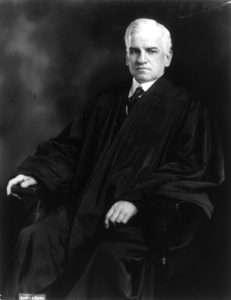9/18/1857: Justice John Hessin Clarke’s birthday.

from Latest – Reason.com https://ift.tt/3kuyAzS
via IFTTT
another site
9/18/1857: Justice John Hessin Clarke’s birthday.

from Latest – Reason.com https://ift.tt/3kuyAzS
via IFTTT

After 27 years of memorable work in films by Steven Spielberg, Martin Scorsese and Wong Kar-Wai, among many others, Jude Law can still surprise us. In The Nest, he gives one of the strongest performances of his career, playing a man whose life has evolved into a shaky edifice of lies, too many of which he has come to believe himself. Law brings a subtle emotional charge to the picture without unbalancing its carefully controlled tempo, and he’s wonderfully well-supported by his costar, the brilliant Carrie Coon (The Leftovers).
The Nest is writer-director Sean Durkin’s first movie since his well-regarded 2011 film Martha Marcy May Marlene (he’s spent most of his time since then producing). The story is set in the mid-1980s. Rory O’Hara (Law) is an expatriate English stock trader now working on Wall Street, and his wife Allison (Coon), an American, is raising their two children, Samantha (Oona Roche) and Benjamin (Charlie Shotwell), on a large, leafy estate. They are prosperous exurbanites—Allison teaches horse riding to well-off local kids—but not prosperous enough for Rory: He wants to uproot the family and return to his native London to take a new job that he says has been offered to him by his old employer, the avuncular Arthur Davis (Michael Culkin).
As is usually the case with Rory’s plans, everything is not what it seems. Arthur didn’t call Rory and invite him back—Rory called Arthur to ask for the job. And the job isn’t really what Rory is interested in. He’s actually scheming to help another company buy out Arthur’s operation and turn it into a global powerhouse —at great financial benefit to Rory, of course.
The relocation to England is agreeably compressed: After the introductory New York scenes, we simply see the family trying to settle into their new home—a way-too-big manor in the Sussex countryside, which Rory has rented for an amount of money he’d rather not discuss. Before long, Allison realizes that their bank account is running dry. Then their telephone service is turned off. Rory keeps bobbing and weaving—there’s “a huge check coming,” he says. But it never materializes.
The story proceeds in a succession of rich scenes: an awkward visit to Rory’s semi-estranged mother (Anne Reid), a gruesome episode with a dead horse, a heartbroken taxi ride (peak Jude Law), and a dinner party that careens completely off the rails when Allison publicly runs out of patience with her husband. (“You’re so full of shit,” she tells him.)
Through all of this, we can see the slow death of Allison’s feelings for her husband passing wordlessly across Coons’ face. It’s a riveting performance, especially when Allison takes in yet another of Rory’s latest brainstorms and delivers the judgment of terminally fed-up spouses throughout the ages. “You’re exhausting,” she tells him.
No Escape
No Escape has the hunched and gasping air of an old-school torture-porn movie (it much resembles Eli Roth’s Hostel films). But there’s no torture! Or rather, there is torture, but you mostly don’t see it—somebody’s always standing in the way when an ear gets lopped off, or an arm gets severed. There’s some very claustrophobic tension, and a good bit of glopping around in the guts of a fresh corpse, but generally, this movie is torture lite.
Like Videodrome, another picture it resembles, No Escape has something to say about modern media—although not enough to amount to a message, really. The protagonist is a hyper-successful vlogger named Cole (Keegan Allen, of Pretty Little Liars). Cole has spent 10 years traveling the world in search of photogenic kicks and he’s built an audience of millions for his web series ERL (“Escape Real Life”). Now, he and his team—three co-adventurers plus Cole’s girlfriend, Erin (Holland Roden, of Teen Wolf)—are flying first-class to Moscow, where a wealthy fan named Alexei (Ronen Rubenstein) has devised an evening of extreme thrills for them. (Alexei is said to be “next-level loaded,” and he’s the object of the movie’s funniest line: “This guy is so rich that everything he does is legitimately the best.”)
The venue for Alexei’s big night out is an abandoned prison (or something), furnished with all the familiar horrors: an Iron Maiden, an electric chair, a rack, and a Houdini-style glass cabinet with water hose hooked up. Naturally, there are also tables filled with torture implements and gore-slicked goons hulking about in black leather butcher aprons. Once each of his companions has been situated in one of the torture devices, Cole is given one hour to free them all—while a world-wide audience of freaks and troglodytes giggles along under their rocks.
Cole’s mission is exceedingly difficult, as you might imagine, but—spoiler—not impossible. Writer-director Will Wernick—whose last movie was simply called Escape Room—keeps the nonsense moving along, and thanks to cinematographer Jason Goodell, the movie looks a lot better than it needed to. The switcheroo ending, however, is not something that Eli Roth would’ve signed off on.
from Latest – Reason.com https://ift.tt/3hHEKuW
via IFTTT
9/18/1857: Justice John Hessin Clarke’s birthday.

from Latest – Reason.com https://ift.tt/3kuyAzS
via IFTTT

Former CNN bureau chief Chip Walter starts his book Immortality, Inc., an examination of the wild dreamers and wealthy financiers striving for human immortality, at Alcor. That’s where heads and bodies of the dead lie frozen, awaiting a possible future in which they can be revived.
Alcor’s customers are still dead, and no magic bullet treatments have meaningfully halted or reversed the cellular and bodily decay we know as aging. The most important thing we’ve learned is that calorie restriction (or treatments that emulate its effects) seem the most promising, if not joyous, path to life extension.
Like space travel, human life extension has seen loads of visionary speculation spun and cash burned with promises mostly unfulfilled. Walter ends his book convinced that Silicon Valley moneymen and their scientist partners are indeed on the cusp of using genomics and artificial intelligence to deliver a near-endless human life; his reporting doesn’t quite deliver on the optimism. But if aging is halted or reversed it will be because of the manias of his subjects, a small group of people and companies—including Google and Human Longevity Inc. (co-founded by Human Genome Project superstar Craig Venter)—with enough wealth to risk wagers on the impossible.
from Latest – Reason.com https://ift.tt/3hBAgWA
via IFTTT

In times of crisis, pop culture often takes on inadvertent meaning, reflecting and refracting the darkness of the times. But few works can manage the eerie prescience of RTJ4, the rowdy, angry, superbly calamitous fourth album by hip-hop duo Run the Jewels, which chronicles a chaotic world in semi-apocalyptic meltdown, beset by police abuse and racial injustice.
The album was released in early June, just days after protests over the killing of George Floyd by Minneapolis police turned destructive in cities across the country. Although it had been in the works for years, the music seemed like it had been willed into existence as a byproduct of the demonstrations.
In the album’s haunting centerpiece, “Walking in the Snow,” Killer Mike raps about the gruesome spectacle of police violence and the performative online outrage that often seems to follow: “And every day on evening news they feed you fear for free/ And you so numb you watch the cops choke out a man like me/ And till my voice goes from a shriek to whisper, ‘I can’t breathe’/ And you sit there in the house on couch and watch it on TV/ The most you give’s a Twitter rant and call it a tragedy.”
The lyrics were so on-the-nose that Run the Jewels member El-P had to clarify that they’d been recorded the previous year—an uncanny reminder that the present crisis actually began long ago.
from Latest – Reason.com https://ift.tt/3iHnRSp
via IFTTT

Former CNN bureau chief Chip Walter starts his book Immortality, Inc., an examination of the wild dreamers and wealthy financiers striving for human immortality, at Alcor. That’s where heads and bodies of the dead lie frozen, awaiting a possible future in which they can be revived.
Alcor’s customers are still dead, and no magic bullet treatments have meaningfully halted or reversed the cellular and bodily decay we know as aging. The most important thing we’ve learned is that calorie restriction (or treatments that emulate its effects) seem the most promising, if not joyous, path to life extension.
Like space travel, human life extension has seen loads of visionary speculation spun and cash burned with promises mostly unfulfilled. Walter ends his book convinced that Silicon Valley moneymen and their scientist partners are indeed on the cusp of using genomics and artificial intelligence to deliver a near-endless human life; his reporting doesn’t quite deliver on the optimism. But if aging is halted or reversed it will be because of the manias of his subjects, a small group of people and companies—including Google and Human Longevity Inc. (co-founded by Human Genome Project superstar Craig Venter)—with enough wealth to risk wagers on the impossible.
from Latest – Reason.com https://ift.tt/3hBAgWA
via IFTTT

In times of crisis, pop culture often takes on inadvertent meaning, reflecting and refracting the darkness of the times. But few works can manage the eerie prescience of RTJ4, the rowdy, angry, superbly calamitous fourth album by hip-hop duo Run the Jewels, which chronicles a chaotic world in semi-apocalyptic meltdown, beset by police abuse and racial injustice.
The album was released in early June, just days after protests over the killing of George Floyd by Minneapolis police turned destructive in cities across the country. Although it had been in the works for years, the music seemed like it had been willed into existence as a byproduct of the demonstrations.
In the album’s haunting centerpiece, “Walking in the Snow,” Killer Mike raps about the gruesome spectacle of police violence and the performative online outrage that often seems to follow: “And every day on evening news they feed you fear for free/ And you so numb you watch the cops choke out a man like me/ And till my voice goes from a shriek to whisper, ‘I can’t breathe’/ And you sit there in the house on couch and watch it on TV/ The most you give’s a Twitter rant and call it a tragedy.”
The lyrics were so on-the-nose that Run the Jewels member El-P had to clarify that they’d been recorded the previous year—an uncanny reminder that the present crisis actually began long ago.
from Latest – Reason.com https://ift.tt/3iHnRSp
via IFTTT

San Francisco officials have kept private gyms closed for months. They claim it is necessary to reduce the spread of coronavirus. But some city-owned gyms have remained open, allowing police officers and other city employees to continue to work out. A local TV station asked city officials to explain why government gyms were allowed to remain open and was told only that private gyms would remain closed at least until the end of September.
from Latest – Reason.com https://ift.tt/2FNbhSS
via IFTTT

San Francisco officials have kept private gyms closed for months. They claim it is necessary to reduce the spread of coronavirus. But some city-owned gyms have remained open, allowing police officers and other city employees to continue to work out. A local TV station asked city officials to explain why government gyms were allowed to remain open and was told only that private gyms would remain closed at least until the end of September.
from Latest – Reason.com https://ift.tt/2FNbhSS
via IFTTT
From Magistrate Judge Kimberly A. Jolson’s opinion yesterday in Ewalt v. Gatehouse Media Ohio Holding II, Inc. (S.D. Ohio):
This case concerns Defendants’ alleged deceptive trade practices that damaged subscribers to the Columbus Dispatch. According to Plaintiffs, “the GateHouse Defendants advertise and offer term subscriptions to The Dispatch … for specific prices, and their customers enter into these agreements … reasonably expecting that the GateHouse Defendants will provide The Dispatch for the number of weeks stated in those Subscription Agreements.” Instead, Plaintiffs allege, “the GateHouse Defendants reduce their customers’ term subscriptions by sending their customers unsolicited ‘premium editions’ and decreasing the length of those subscriptions based on the value the GateHouse Defendants arbitrarily assign to these premium editions.” …
The parties’ dispute concerns a series of Defendants’ internal emails and Plaintiffs’ use of those emails in their Opposition. Defendants contend that portions of Plaintiffs’ Opposition and Exhibit C containing those emails should be redacted because they contain trade secrets…. Generally, [the e-mails] discuss the number of premium editions to be issued, the price of those premium editions, Dispatch subscribers’ frustration with the premium-edition policy, and Dispatch employees’ opinions regarding the same….
[But, first,] Defendants have not demonstrated that the specific information they seek to redact from Plaintiffs’ Opposition is, in fact, a trade secret…. [And, second,] Defendants are required to show that “disclosure will work a clearly defined and serious injury … And in delineating the injury to be prevented, specificity is essential.” General representations of some potential undefined harm, like those made by Defendants, are insufficient to justify redacting the information in question.
Ultimately, “[o]nly the most compelling reasons can justify non-disclosure of judicial records.” Even “[w]here a party can show a compelling reason for sealing, the party must [still] show why those reasons outweigh the public interest in access to those records and that the seal is narrowly tailored to serve that reason.” “[I]n class actions—where by definition some members of the public are also parties to the case—the standards for denying public access to the record should be applied…with particular strictness.”
Defendants have not demonstrated that the information contained in Plaintiffs’ Opposition is a trade secret. And, because this is a purported class action concerning central Ohio’s primary newspaper, the public has at least a moderate interest in viewing the information in question. The relevant portion of Plaintiffs’ Opposition contains information regarding the Dispatch’s subscription policies and Dispatch employees’ opinions regarding the same. On the record before the Court, there is no reason for the Court to prevent the public from viewing that information….
The public has a right to know ….
from Latest – Reason.com https://ift.tt/3hA1zk4
via IFTTT